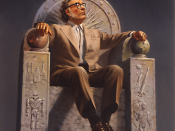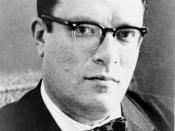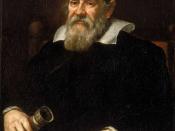Trying to Understand God's Mind In the interview Isaac Asimov had with Moyers', Asimov explains of what science is and how it differs from religion. Asimov explains that science is a device, a way of trying to improve your knowledge of nature. He also describes that science is a method for analyzing your thought against the cosmos and find out whether they match. He discusses that science and religion are different because in the church they teach only what they believe. In science they only teach what scientist think is the way the universe works. In Stephen Hawking's book A Brief History of Time, Hawking's approach to science is not only to understand " God's mind,"� but also to look at the universe and test the hypotheses against the observation.
Among the phenomenon he has an idea discovered on the eventual element of matter through his chapter " Space and Time"�, " The Uncertainty Principle"�, and " The Arrow of Time"�.
In " Space and Time"� Hawking discusses the history of ideas about cosmology and how our present day understanding of the universe has developed. It dates back to Galileo and Newton. Before them people believed Aristotle, who said that the physical state of a body was to be at rest and that it moved only if motivated by a energy or desire. Aristotle says that a heavy ball would fall faster than a light one, because it would have a greater pull towards the earth. Aristotelian tradition said that one could work out all the laws that govern the universe by pure thought: so there was no need to check the observation. So no one until Galileo bothered to see whether bodies of different weight did in fact fall at different speeds. It is said that Galileo was the...


